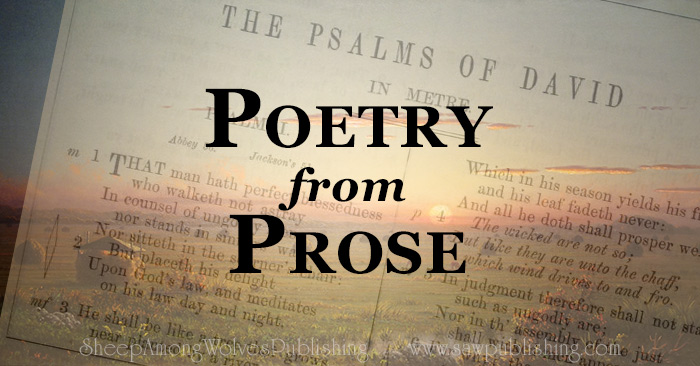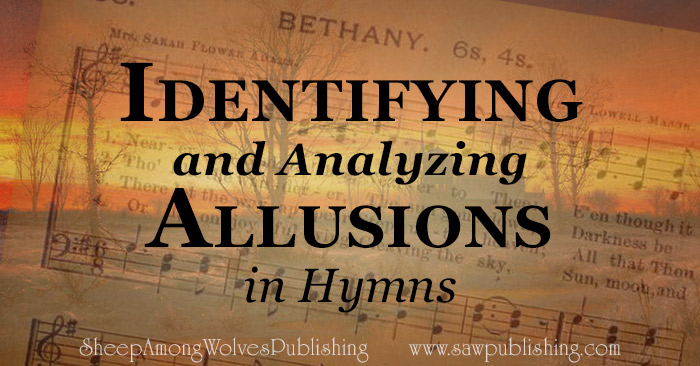Poetry from Prose – Faithful Meterizations

Have you ever come across a verse in your Bible, and thought to yourself, “Oh, I know that verse. That’s from such-and-such a hymn”? Well, actually, the hymn was from the Bible verse, but it was because of the hymn that the verse stuck in your head. Poetry has a remarkable power of doing just that—sticking firmly in the mind, with an effortlessness which prose can simply never attain.
This can be a little bit annoying at times. We’ve all gotten sick of “Old MacDonald” or “The Wheels on the Bus” when we happened to be on a long car ride with a small child.
On the other hand, I’m sure you can all picture yourself in the scene we described above, having remembered by the aid of a hymn something you would otherwise have forgotten. Every year I go to a performance of Handel’s Messiah at Christmastime, and then all through the year there is an extra pleasure in finding, one after another, the passages I already know—because they were set to music that I remembered.
Paraphrased passages of Scripture are the ultimate example of Bible concepts captured in a way that our minds will remember.
History and Background of Faithful Meterizations
Paraphrases of Scripture, especially the Psalms, formed the first category of hymns (apart from chants) to find acceptance in the English-speaking church. In many ways, the Scottish Psalter of 1650 fills the same position towards English hymnody as Pilgrim’s Progress does towards the English novel. Many other meterized versions of the Psalms, along with selected paraphrases of other passages, have been written before and since, but few are so faithful or so accepted as the Scottish Psalter.
Tate and Brady’s “New Version of the Psalms” (1696) became to the English church what the Psalter was to the Scottish church and for more than a hundred years was the standard version used by the Church of England. It was only after paraphrases had become well-established that the way was paved for hymnists such as Isaac Watts, and a little later Charles Wesley, to pioneer the original hymn which has enjoyed complete and lasting acceptance in English-speaking Christianity. Without the important link of early meterizations, especially the Psalter and the “New Version”, it is hard to tell how soon hymnody would have found a place in the English-speaking world.
Aspects of Great Paraphrases
There are several key areas of paraphrasing which are of importance in creating an exceptional meterized passage. Recognizing and understanding these areas is helpful both in writing and examining paraphrases, because it pinpoints specific areas which are pivotal in creating truly great meterizations.
Faithfulness to the Text
The most important of these aspects is faithfulness to the text. Naturally, when dealing with the Bible, it is critical to stick as closely to the meaning of the original as possible, and to be dedicated to rendering faithfully every phrase contained in the passage. This can be a difficult task, given the restraints of poetical structure, but it is most necessary to avoid blurring and distorting the original sense—or reversing the meaning altogether.
A few techniques which are helpful in achieving faithfulness are the use of the Bible’s exact wording, the avoidance of interpretation, and the choice of words as close as possible to the original in situations where it becomes necessary to depart from the Bible wording and order. These simple strategies provide powerful keys to faithful meterization, and are made easier if the paraphraser is very familiar with the style of the passage he is paraphrasing, and similar passages throughout Scripture, since it will be more intuitive for him to substitute appropriate words.
Metre and Rhyming Choices
The second aspect is connected to the first, and is the metre and rhyming devices employed in the paraphrase. The choices made here impact closely the ability of the author to preserve the meaning faithfully. Simpler or more difficult metres can make the task easier or harder, and the choice of rhyming words can also increase or decrease the likelihood of faithfulness.
As a general rule, longer lines and simpler rhyming patterns allow the paraphraser greater flexibility, and raise the odds of a faithful meterization. It is noteworthy that this easy bias towards longer and simpler structure, results not only in increased faithfulness but also increased beauty and poetry.
Style and Flow
The third aspect is the style, flow and overall poetry of the finished product. This is a much subtler part of paraphrasing, and the choices which determine these attributes are often made unconsciously on the part of the author.
Word variations and orders, older or newer forms, and how well the words chosen fit the emphasis of the metre, all combine to give an overarching feel and flow which greatly impact the poetry of the paraphrase.
This is perhaps the aspect in which the author’s innate ability is most important, because the sense of what makes a poem with good overall flow and style is largely intuitive. For those with less native ability, a due amount of diligence in the first attribute we discussed will tend to eliminate difficulties here.
Considering all the aspects which go into a truly great paraphrase, it ought to be apparent that paraphrasing is possibly one of the most difficult forms of English poetry.
As we look at individual hymns in this series on hymn allusions, we will go into more depth as to how each of them measures up to these standards and why.

Bible Verses We Can Remember
Perhaps the most potent argument for faithfulness in paraphrasing comes from the tremendous good which a paraphrase can do. Whatever the reason may be, poetry sticks in our minds far more readily than prose. A truly faithful paraphrase can affix the words of Scripture so firmly in our minds and hearts that they come back to us in times of trial, difficulty or disappointment.
Obviously, an unfaithful paraphrase would be dangerous, inasmuch as it helps us retain the wrong interpretation. A number of years ago, I learned a paraphrase of the first part of Psalm 62 which really stuck in my head. Some of the stanzas were very exact and recall the Scripture verses accurately to mind, but one of them completely misinterpreted and reversed what the Bible was saying. I have to think for a minute or two before I remember the real words.
On the other hand, this past summer I learned a very beautiful, very faithful meterization of Psalm 61. The verses from the original are reordered in the paraphrase, and there are one or two places where the author has taken a specific statement about David’s life and situation, and changed it to suit Christians in general, but each phrase is so well transferred that I have the exact Bible words memorized for about 85% of the Psalm.
And of course, the ability to sing these paraphrased Psalms or passages makes them one of the most important forms of hymnody, because we have more opportunities to sing hymns than to recite Bible passages. And like we mentioned above, they stick with us better! You might not be able to recite passage after passage by heart, but you might be able to hum a few lines of a paraphrase. Memorizing Psalm 119 might look like a daunting task, but a paraphrase of one section might not. Even as we go about our daily lives we are more likely to sing a hymn than recite a Psalm, but if we sing a faithful paraphrase, we are, in essence, doing both!
- Word of the Week Lesson #26 – ATTEND
- The Robin Hood Dilemma: Recognizing Moral Inconsistencies in Literature


Such a beautiful post! I am not sure if you are the one who left such sweet encouragement on my blog today? Whoever left it, I just wanted to say it was much needed and much appreciated!! God bless you and the amazing ministry you have here. I am so happy to visit you for the first time!
Happy to return some of the encouragement we have found through your blog, Cheryl.